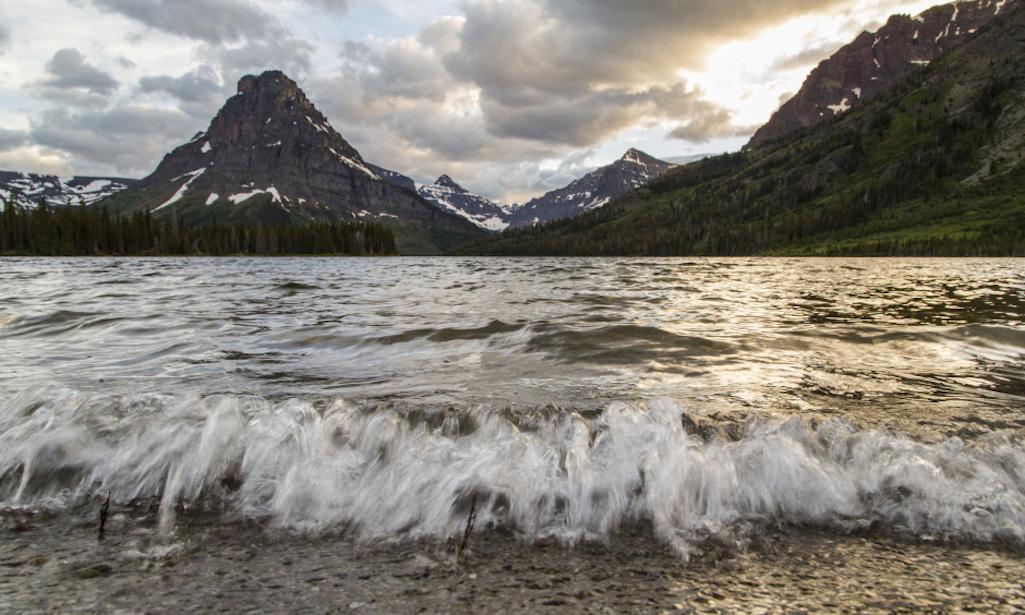
Groups appeal ruling that could bring drilling to Badger-Two Medicine area/NPS file
A court ruling that opens the door for energy development on a roadless area of the Helena-Lewis and Clark National Forest located adjacent to Glacier National Park, the Bob Marshall Wilderness Complex, and the Blackfeet Indian Reservation has drawn criticism from tribes and conservation groups who have appealed the decision.
At issue is an energy lease that had been canceled in the Badger-Two Medicine area of the national forest. The judge in early September reinstated the Solenex, LLC lease, ruling that it had been properly issued and so not subject to cancellation.
“It’s just more of the same from people who refuse to consult with the Blackfeet Nation about the industrialization of our last cultural refuge,” John Murray, Blackfeet Tribal Historic Preservation Officer, said this week after an appeal was lodged. “We’ve lived under this kind of reckless threat to our sacred lands for decades, and we will never surrender to roads and drill rigs in the Badger-Two Medicine.”
Murray also leads the Pikuni Traditionalist Association, which was among the coalition of groups intervening to defend against the lawsuit brought by industry. The Blackfeet Nation also has filed legal briefings in the case, defending the Badger-Two Medicine against the roads and drill rigs associated with the controversial lease.
U. S. District Judge Richard Leon rejected the federal government’s rationale for cancelling the Solenex lease, and disagreed with the claims that drilling and roadbuilding in the Badger-Two Medicine would irrevocably harm the cultural and ecological values of the area, which is a designated Traditional Cultural District. His ruling reinstates the Solenex lease in the heart of the Badger-Two Medicine Area.
"The Court finds that the [Interior] Secretary lacked authority to rescind the lease, and that the Secretary further acted in an arbitrary and capricious manner in disapproving the previously approved application for permit to drill," wrote Leon.
In the 36-page ruling the judge also said the Interior Department was wrong to hold that the lease if allowed had "the potential to to adversely affect the power and spirituality of the entire district."
"Because the government improperly considered prospective harms that are not 'adverse effects' within the meaning of the NHPA [National Historic Preservation Act] and its implementing regulations, that determination was also arbitrary and capricious," he wrote.
Located between Glacier National Park, the Bob Marshall Wilderness, and the Blackfeet Indian reservation, the Badger-Two Medicine Area is within an area of Montana’s Rocky Mountain Front that Congress withdrew from future oil and gas leasing in 2006. The 132,000-acre Badger-Two Medicine area has had a series of lease retirements over the past decade. In 2016, Devon Energy agreed that in return for sunk costs it would voluntarily relinquish its 15 leases within the Badger Two Medicine area (totaling 23,000 acres).
In 2019, Moncrief Oil and Gas Master, LLC reached agreement with The Wilderness Society to release its leases in the area to avoid going to court. That settlement left Solenex's 6,200-acre lease as the only one remained in Two-Badger. It had been cancelled by the federal government in 2016, but reinstated in 2018 after the D.C. District Court ruled for Solenex. That ruling was then appealed.
Peter Metcalf, executive director of the Glacier-Two Medicine Alliance, noted that the struggle over the fate of the Solenex lease has included both disappointments and victories. “We have had to overcome many setbacks throughout this nearly 40-year effort to prevent irresponsible energy development from these ecologically and culturally vital lands,” Metcalf said. “Yet despite the immense obstacles, we’ve managed to prevent any development and retire 46 other leases. The narrative is clearly trending toward protecting the Badger-Two Medicine and I’m confident we will ultimately eliminate this final lease too.”
As evidence, Metcalf pointed to the recent U.S. Forest Service plan that acknowledges and protects the remarkable natural and cultural values of the Badger-Two Medicine, and a recent statewide poll that shows nearly 80 percent of Montanans support tribes adopting a greater management role on culturally important public lands. These developments follow several protective decisions in the Badger-Two Medicine: the area is now designated a Traditional Cultural District; it is protected by the Forest Service’s Roadless Rule and a ban on motorized use, both of which limit future road building and logging in the area; and Congress has prohibited all future mineral exploration, including oil and gas leasing, throughout the area as well.
“These protections and public sentiments reflect the fact that the Badger-Two Medicine is a world-class landscape,” Metcalf said. “It’s some of the absolute finest habitat we have for Montana’s wildlife, habitat that is essential to sustaining the renowned wildlife of Glacier National Park and the Bob Marshall Wilderness.”
Tyson Running Wolf, a Montana state legislator, former Blackfeet Tribal Business Council member, hunting outfitter, and leader among Blackfeet traditionalists, said the Solenex executives and attorneys simply do not understand the importance of the Badger-Two Medicine to Blackfeet culture and lifeways.
“This is a place where original creation still lives,” Running Wolf said. “There are very few of those places left on this Earth. The stakes here go way beyond a couple years of profit for some oil company. This is our inheritance and legacy we’re talking about. This is about our cultural survival as Blackfeet People.”
Pikuni Traditionalist Association and Glacier-Two Medicine Alliance were joined in defending the lawsuit by Blackfeet Headwaters Alliance, Wild Montana (formerly Montana Wilderness Association), National Parks Conservation Association and The Wilderness Society. Represented by Earthjustice, the coalition is considering all legal options.
Traveler footnote: Earthjustice supports the Traveler's reporting on scientific matters from the National Park System.



Add comment